| Srl | Item |
| 1 |
ID:
188312
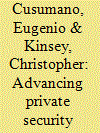

|
|
|
|
|
| Summary/Abstract |
On the 20 March 2003, George W. Bush launched Operation ‘Iraqi Freedom’. At the time, it was unlikely anyone in his administration envisaged that United States (US) troops would eventually rely on the largest force of private military contractors in recent times. Victory over Saddam Hussein and the ensuing occupation and reconstruction of Iraq would have not happened without the support of military contractors working behind the scenes to ensure that combat troops receive adequate supplies, maintain vehicles and equipment, and protect military bases and convoys. In Afghanistan, the US and the other countries participating in the North Atlantic Treaty Organization (NATO) International Security Assistance Force mission relied on contractors providing logistics and armed security to an even larger extent. The NATO-trained Afghan military itself inherited US dependence on contractors, whose departure from Afghanistan alongside American soldiers was identified as one of the factors underlying Kabul armed forces’ inability to confront the Taliban’s advance.
|
|
|
|
|
|
|
|
|
|
|
|
|
|
|
|
| 2 |
ID:
160622
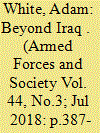

|
|
|
|
|
| Summary/Abstract |
Through the lens of veterans studies, we know a great deal about the fate of those soldiers who have recently returned home following a period of deployment in Iraq and Afghanistan, yet counterintuitively we know nothing about the plight of the private military contractors who worked alongside them. Addressing this blind spot, the article explores the socioeconomic trajectories of “private military veterans” from a life-course perspective. Specifically, it addresses three questions regarding their status in the civilian labor market. What occupations do they work in? To what extent do they work in similar occupations to public military veterans? To what extent do they work in similar occupations to the general population? Focusing on the U.K. case, it reveals that private military veterans are significantly overrepresented in the “protective service occupations,” where they primarily work in the private security industry, and offers a multilayered explanation for this distinctive clustering effect.
|
|
|
|
|
|
|
|
|
|
|
|
|
|
|
|
| 3 |
ID:
090743
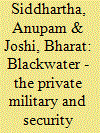

|
|
|
| 4 |
ID:
165693
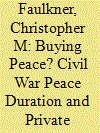

|
|
|
|
|
| Summary/Abstract |
Do Private Military and Security Companies (PMSCs) impact peace duration after civil war? I argue that the role these organisations play in a conflict can impact post-conflict stability. Specifically, I suggest that variance in services provided by PMSCs can influence rebels’ calculations about relative capabilities. These calculations then contribute to the probability for civil war recurrence. Building on the bargaining framework, with a focus on information and commitment problems, this article demonstrates that PMSCs participating in armed combat operations can jeopardise the stability of peace following civil war. Three case narratives (Angola, Sierra Leone and Croatia) are used to probe the theoretical argument and results are illustrative – PMSCs serving as force multipliers contribute to an increase in the probability for conflict recurrence.
|
|
|
|
|
|
|
|
|
|
|
|
|
|
|
|
| 5 |
ID:
099510
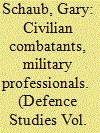

|
|
|
|
|
| Publication |
2010.
|
| Summary/Abstract |
States have increasingly replaced military personnel with armed civilian contractors. Are these civilians members of the military profession? I address this question in two ways. First, I assess whether armed contractors exhibit the characteristics of the profession of arms: expertise in the application and management of violence, provision of cost-effective solutions within the jurisdiction of warfare, legitimacy derived from the state and polity, and a recognized corporate identity. Then I assess the views of 260 elite American field grade officers. I find that armed contractors do share many of the characteristics of military professionals but that officers do not view the civilian contractors as military professionals, are uncomfortable with their intrusion into the profession of arms, and are cognizant of their negative effects but some ambivalence in their responses suggests that the boundaries of the profession of arms are being permeated by civilian contractors acting in combat roles.
|
|
|
|
|
|
|
|
|
|
|
|
|
|
|
|
| 6 |
ID:
080874
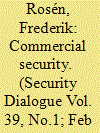

|
|
|
|
|
| Publication |
2008.
|
| Summary/Abstract |
Today, in what has been described as a re-emergence of privately organized extraterritorial force, the private military and security industry supplies the major military powers with a range of core services. This article asks how such a development came about, and why it has become politically uncomplicated to outsource such intimate state functions as the executive branches of foreign policy programmes. How did certain states arrive at a situation where it is unclear whether core military and security affairs are run by public or private agencies? The article answers these questions by presenting and commenting on general explanations as to why the private military industry has grown so much in post-invasion Iraq. It adds new perspectives to existing scholarly work by suggesting that the reappearance of private extraterritorial force could not have occurred on such a scale without a restructuring of neutrality in international relations. It is suggested that this change in neutrality might constitute the sine qua non of the re-emergence of private extraterritorial force.
|
|
|
|
|
|
|
|
|
|
|
|
|
|
|
|
| 7 |
ID:
062634
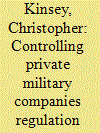

|
|
|
| 8 |
ID:
068226
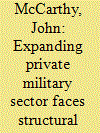

|
|
|
| 9 |
ID:
107935
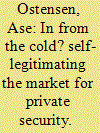

|
|
|
|
|
| Publication |
2011.
|
| Summary/Abstract |
Private military and security companies have gained political authority within the governance of security, but the increasing authority seems unmatched by legitimacy. This article analyzes self-legitimation efforts by the dominant Western industry. It draws on two different theoretical perspectives of legitimacy, organizational legitimacy and democratic legitimacy, and argues that four dimensions of legitimacy are relevant to these companies. The article finds empirically that there are different degrees of deficits in each dimension and discusses the use of some corresponding legitimating strategies used by the industry. Findings indicate that much effort currently seems concentrated on building input legitimacy, while there are also less concerted efforts to cultivate both output and moral legitimacy. The article warns that, if unchallenged, legitimation campaigns may lead to further accumulation of private influence on military and security policies, both nationally and internationally.
|
|
|
|
|
|
|
|
|
|
|
|
|
|
|
|
| 10 |
ID:
134147


|
|
|
|
|
| Publication |
2014.
|
| Summary/Abstract |
This article contributes to the existing critical theory and gender scholarship on private military security companies by examining how the gendered subjectivities of third-country nationals (TCNs) are constituted through the intersections of colonial histories and neoliberal economic practices. Focusing on Gurkha contractors, I ask how it is that both the remuneration and the working conditions of TCNs are inferior to those of their white Western peers within the industry. The article shows that Gurkhas' working conditions flow from their location on the periphery of global employment markets, a disadvantage that is further inflected by their status as racially underdeveloped subjects. Thus, their material and cultural status within the industry - regardless of the abilities of the individuals in question - is argued to be the outcome of tenacious colonial histories that continue to shape the labour-market opportunities of men from the global South within larger global security governance practices that increasingly feature outsourcing of military labour in operations.
|
|
|
|
|
|
|
|
|
|
|
|
|
|
|
|
| 11 |
ID:
146203
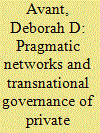

|
|
|
|
|
| Summary/Abstract |
In 2004 private military and security companies lacked effective transnational governance. Ten years later, however, an agreed-upon framework drew these services within established international law. It inspired various complementary non-binding instruments and instigated changes in government policy. Hegemonic-order theories, whether realist or liberal, would expect this change to reflect shifts in US preferences. But the United States displayed no initial interest in transnational coordination. I build an alternative explanation from pragmatism and network theory. A Swiss-led process created connections among stakeholders around the problem of regulating private military and security companies. Relatively open interactions among participants spurred original ideas, which in turn appeared useful for addressing the issue. Their usefulness, led more actors to “buy into” the process. This relational-pragmatic account offers new ways for understanding the nature and development of governance.
|
|
|
|
|
|
|
|
|
|
|
|
|
|
|
|
| 12 |
ID:
130910
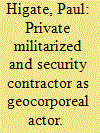

|
|
|
|
|
| Publication |
2012.
|
| Summary/Abstract |
As a consequence of the ontological and epistemological traditions dominating the private military and security company literature to date, the embodied dimensions of the industry have been overlooked. The current article addresses this lacuna through a phenomenological focus on the links between military corporeal conditioning, possibilities for the industry's emergence, and the impact of contractors on security. I develop the concept of geocorporeality to make explicit the geopolitical relevance of security contractors' military trained bodies. The article concludes by drawing out the implications of this embodied line of enquiry for questions of contractor accountability and agent intentionality.
|
|
|
|
|
|
|
|
|
|
|
|
|
|
|
|
| 13 |
ID:
083087
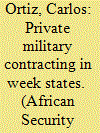

|
|
|
| 14 |
ID:
139199
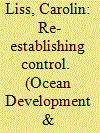

|
|
|
|
|
| Summary/Abstract |
In response to the increasing employment of Privately Contracted Armed Security Personnel (PCASP) to protect vessels against pirate attacks, some flag states introduced new regulations that allow the use of PCASP. The introduction of these new regulations was at least in part an attempt to (re)establish state control of violence. This article provides the background and theoretical framework for this special issue, which discusses how states with national registers approached the regulation of PCASP. Summarizing its major findings, the article concludes that even when states attempted to govern the use of PCASP, operational difficulties resulted in significant shortcomings in state control.
|
|
|
|
|
|
|
|
|
|
|
|
|
|
|
|
| 15 |
ID:
122252
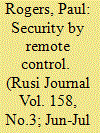

|
|
|
|
|
| Publication |
2013.
|
| Summary/Abstract |
The dominant trend in international security over the past decade has been a move towards 'remote control': the increasing use of special forces, private military and security companies and remote systems at the expense of the engagement of large forces. Paul Rogers analyses how this trend has developed, and asks whether it can really provide an appropriate response to the likely threats against global security in the coming years.
|
|
|
|
|
|
|
|
|
|
|
|
|
|
|
|
| 16 |
ID:
103221
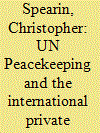

|
|
|
|
|
| Publication |
2011.
|
| Summary/Abstract |
UN peacekeeping continues to confront qualitative and quantitative difficulties. Arguments in favour of using private military and security companies (PMSCs), particularly those referring to the 1990s-era when Executive Outcomes was operating, have been aired. The article examines earlier operational arguments for PMSC participation in UN peacekeeping, which at times have been reintroduced in more recent assertions: (1) PMSCs have better organization, training, and equipment; (2) they have a heightened willingness to apply force to serve UN mandates; and (3) they enjoy enhanced readiness to respond. The article argues, however, that it would be difficult for contemporary PMSCs to respond effectively, quickly, and robustly should the UN turn to them for enforcement operations. State and market pressures have conditioned PMSCs to operate in a manner dissimilar to that in the 1990s.
|
|
|
|
|
|
|
|
|
|
|
|
|
|
|
|